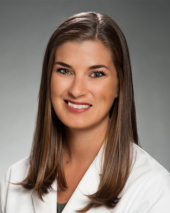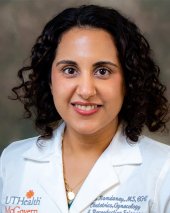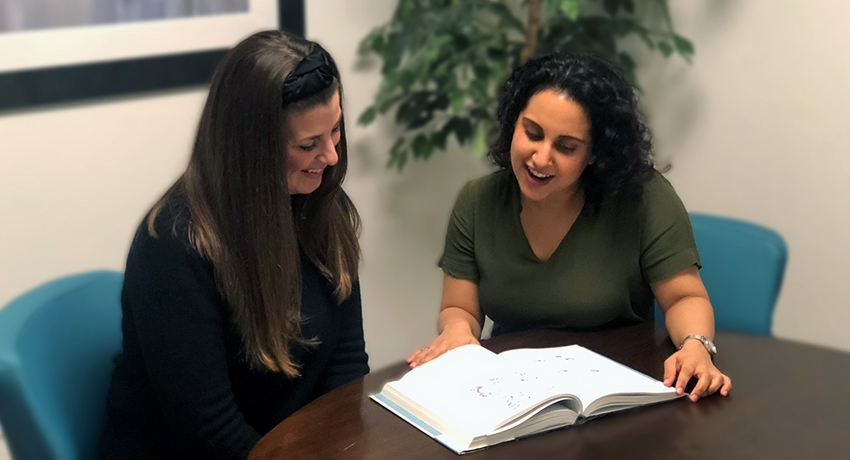Prenatal genetic counseling plays a significant role for patients navigating the pregnancy journey – whether they are seeking to become pregnant or already on the pregnancy path.
This service within select UT Physicians women’s health clinics comprises 12 reproductive genetic counselors throughout Houston and represents one of the largest teams in the country. They focus on guiding patients through the complexities of understanding family history, genetic testing, and ultrasound findings while providing individualized support and resources. They also work to educate other medical professionals, the next generation of genetic counselors, and the public by participating in advocacy organizations, professional associations, and supervising and teaching genetic counseling students.

Blair K. Stevens, MS, CGC, director of UT Physicians Prenatal Genetic Counseling Services, considers it a privilege and a huge responsibility to ensure her team delivers excellent genetics care in the reproductive space.
“I am very proud that UT does it on such a huge scale for so many Houstonians,” said Stevens, associate professor in the Department of Obstetrics, Gynecology, and Reproductive Sciences at McGovern Medical School at UTHealth Houston.
Value of collaboration
Genetic counseling, by nature, is a multi-disciplinary field that can’t be done without maternal fetal medicine specialists, sonographers, obstetricians, and more. Having genetic counselors in-house at UT Physicians, rather than outsourcing genetic counseling services, provides a number of benefits to patients. For example, patients who are concerned about an ultrasound finding or their family history often benefit from speaking with both a maternal fetal medicine specialist and a genetic counselor. Communication between specialists is crucial for enhancing the quality of personalized care.

“Using this team approach, we can relay the patient’s values and needs to each other plus we can strategize the best management plan,” Stevens said. “I wouldn’t have it any other way for our patients.”
For Aarti Ramdaney, MS, CGC, assistant director of Prenatal Genetic Counseling Services, part of her mission is focusing on outreach to local providers and other physicians in Texas to inform them that genetic counseling is an option through telemedicine. She is thrilled they can provide accessible care to Texas families who have previously struggled to access genetic counseling expertise. Although Houston has a large genetic counseling community, there are many parts of Texas where genetic counseling is not easily available.
Compassion and care
Genetic counselors also provide much compassion. Ramdaney considers the psychosocial aspect of genetic counseling as her niche in the field. Health care is more than logic and facts, she says. The field can present challenging realities for families where critical findings on an ultrasound might reveal concerns for a life-limiting diagnosis.
“There’s so much emotional conflict that can be going on in challenging situations,” said Ramdaney, assistant professor in the Department of Obstetrics, Gynecology, and Reproductive Sciences at McGovern Medical School at UTHealth Houston. “It’s helping families process what is often very unexpected information, providing reassurance, and validating their testing and reproductive decisions.”
Ramdaney said often the big question is “why?” Patients ask, “Why is this happening? How do we best take care of our baby? What’s the chance for this to happen again in another pregnancy?” She believes genetic counseling has so much utility for families, when answering those questions is so vital.
“Those are the cases that stand out to me,” Ramdaney said. “How do we accompany them on that journey and make sure they still get what’s important to them.”
Balancing hopes and fears
Stevens said she tells her students that their job is not to make patients feel better. Many times, the news they share with patients doesn’t make them feel better.
“Our job is to make them feel empowered by information and help them realize there is always something to hope for – even in the midst of a diagnosis or a birth defect,” Stevens said. “It’s making sure they find the resources to balance those hopes and those fears.”
For information-seeking patients, Stevens said they appreciate getting a wealth of information before delivery to help them with the adjustment. Knowing a diagnosis ahead of time allows patients to emotionally adjust, do research, and find support networks.
“I love being there when patients don’t know where to turn, and when they are desperately seeking information and support,” Stevens said. “It’s what I love best about my job.”



